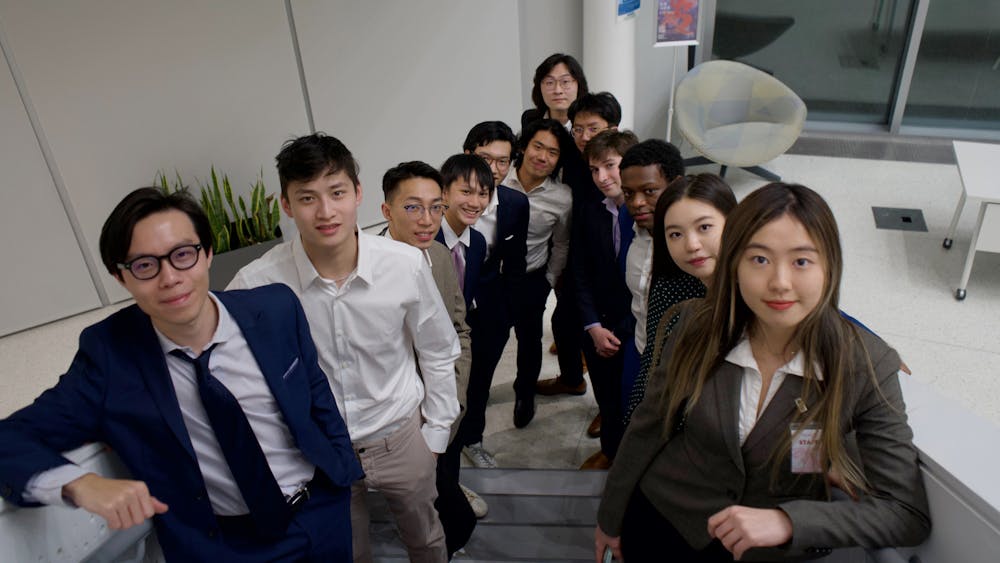The annual Brown China Summit — a conference that brings together leaders and scholars from different fields to engage in critical discussions on U.S.-China-related issues — took place at the Stephen Robert ’62 Hall last weekend.
This summit centered around the theme “Discovery and Recovery: How China Can Balance, Lead and Follow in 2023.” The summit included 13 panels on political economy, sustainability, international relations, business and other topics.
Leung Chun-ying — former chief executive of Hong Kong and current vice chairman of the National Committee of the Chinese People’s Political Consultative Conference — was this year’s keynote speaker. Leung led Hong Kong from 2012 to 2017, including during the “Umbrella Movement” in 2014 that called for increased citizen involvement in the city’s elections, and stepped down at the end of his term in July 2017.
On Saturday evening, Leung spoke virtually with Chas Freeman, former U.S. Ambassador to Saudi Arabia, who also served as the primary interpreter during President Richard Nixon’s 1972 visit to China.
Leung’s keynote talk, also virtual, focused on the development of Hong Kong and the Greater Bay Area. “Hong Kong is definitely a very interesting and attractive place for young people to develop their career,” Leung said.
Other panelists included National Academy of Governance Professor Peijun Duan; artist Suzanne Anker; former Deputy Assistant Secretary of State for the Bureau of South and Central Asian Affairs Susan Elliott; George Washington University Professor of Law Donald Clarke; and urbanist Alain Bertaud.
This year’s summit was the second to take place in person since the onset of the COVID-19 pandemic, according to BCS Co-President Joey Qiu ’24. Last year’s summit organizers dealt with returning to “putting on an in-person event,” while this year the team was able to expand on the previous year’s foundation, he added.
“China is coming back from a tough year of COVID and domestic turbulence,” Qiu said. The theme is about recovering, “rediscovering what China’s strengths are moving forward” and finding “balance between” both leading and following, he noted.
According to Qiu, he and BCS Co-President Autumn Qiu ’25 aimed to “provide a space for engaging dialogue,” “increase the diversity of the team” and “attract audiences from more backgrounds and perspectives.”
“We started emailing speakers in September,” said Xiaokang Xue ’25, director of the summit’s sustainability-focused panel. The list of speakers was finalized earlier in the year.
“The summit this weekend had over 350 (attendees),” Joey Qiu told The Herald — a seven-fold increase over 2022’s total. “And many of the audience (members) were non-Chinese.” The increase in audience numbers and diversity was “huge progress” for the summit, he added.
“One of the biggest difficulties we encountered was how to present a conference about China to a group of American and international students,” said Joey Qiu, emphasizing that a “key solution” was creating a more diverse team.
Joey Qiu said he hopes that the summit helped audiences enhance their understanding of China. “Many people have a preconception about China,” he said. “The main goal of the conference was for everyone to walk out of the panels and (look) at China from more dimensions.”
Patrick Anders ’25 joined the summit’s finance team this year and directed its “Order and Law” panel, finding panelists through team members’ connections, alumni or the University.
“We’ve had great speakers in the past, and we used the brand name and the great work we have done to show people that they should also join,” Anders said.
Enthusiastic about environmental protection, Xue told The Herald that he gained more experience in event organizing and learned about sustainability through moderating the panel.
“I think international collaboration is very important in combating climate change, especially the cooperation between the U.S. and China,” he said. “I hope the panel facilitated conversation on sustainability at Brown and beyond.”
This was the second year Danny Xu ’23 attended the summit. “I’m interested in the political economy and international relations panels,” Xu said. “They had really good guests coming to speak.”
Xu said he particularly enjoyed listening to Freeman, who also moderated the panel on "China's Rise in International Relations.”
“The panel was more practitioner-focused than last year,” Xu told The Herald. “There were people who could share stories and fun facts, and I think this made it more accessible to the general audience.”
Harry is a staff writer for The Brown Daily Herald. Harry is a sophomore from Beijing, China majoring in ceramics at RISD.





